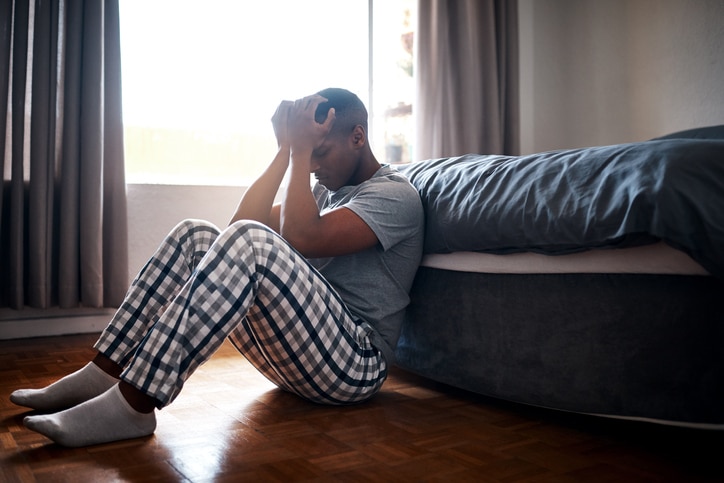By Clint Fletcher
Depression has done nothing but rear its ugly head more than usual during the last year. It makes perfect sense, too. Most of us are scared, disconnected, and worried about the health of loved ones and ourselves. According to the Centers for Disease Control and Prevention (CDC), 40% of all U.S. adults were struggling with mental health or substance abuse issues in late June, right in the middle of the pandemic. Out of those people, 31% reported symptoms of depression, and 11% even considered suicide.
Signs of Severe Depression

Here are some signs that you may dealing with severe depression:
- Irritability
- Losing concentration
- Feelings of hopelessness
- Loss of pleasure
- Waves of overwhelming sadness
- Agitation
- Extreme anxiety
- Learning impairment
- Can’t get out of bed
- Insomnia
- Fatigue
- Suicidal thoughts of ideations
Most of us are scared, disconnected, and worried about the health of loved ones and ourselves.
We have to beat depression back in all the ways we know how. Here are five ways to do it:
1) Connect with others
It’s a real gut punch that the thing COVID affects the most is the thing we need the most to stay mentally healthy. Connection is absolutely key to begin finding your way out of depression. Connect with others digitally until you’re able to meet up with them for socially distanced outdoor events. Cookouts, dog-walking, fishing, golfing, and kickball games are great ways to connect with people safely. If you don’t feel like doing any of these activities, there’s always Zoom meetups. If you’re in recovery, there are AA Zoom meetings all day long (as well as other 12-Step programs like ACA and SLAA). A good old-fashioned phone call can really improve your mood as well.
2) Go to therapy
Speaking of Zoom, it’s also a great tool to link up with a therapist and other mental health professionals for therapy sessions. It is now a known fact that between 80-90% of people that suffer from depression eventually respond well to treatment, according to the American Psychiatric Association. Therapists are highly trained and know how to treat depression based on the personal issues of every individual, and depression could be a sign that some inner-child work needs to be done. If you have deep-rooted and untreated childhood trauma, a therapist may use a variety of techniques to teach you to nurture your emotionally neglected inner child, which often leads to healing and relief from depression. Other trauma therapies include EMDR and Cognitive Behavioral Therapy. If you aren’t available through Zoom, many therapists will agree to phone sessions.
3) Exercise for the endorphins
Consistent exercise can help relieve depression by releasing feel-good endorphins, brain chemicals that almost immediately enhance your well-being. The effects of a good workout can also keep depression from occurring in the first place by relieving the cycle of negative thoughts that may have been feeding your symptoms. Try an online exercise class or head outside for some running, hiking, Rollerblading, yoga, rock climbing, kayaking, sailing, or martial arts classes.
4) Eat healthy, regular meals
A controlled trial published by the journal PLOS ONE found that depression symptoms dropped among a group of adults when they followed a healthy Mediterranean-style diet for three weeks. Participants in the study who once described their depression in the “moderate” range later reported a drop to “normal” range, as well as a drop in anxiety levels. Another study published by the National Library of Medicine found that a diet loaded with vegetables, fish, whole grains, low-fat dairy, and fruit was connected with a lower risk of depression, while a red meat, sweets, and high-fat dairy diet were linked to a higher depression risk.
5) Assistive medication
When all else fails, it may be time to talk to your doctor or psychiatrist about medication. Some suffering from clinical depression try everything under the sun with no relief. This may be due to brain chemistry issues that require higher levels of serotonin to turn things around. Medication of this nature is recommended to accompany psychotherapy instead of replacing it.
A good old-fashioned phone call can really improve your mood …
When to Enter Treatment for Depression
If you or your loved one is experiencing severe depression symptoms, it may be time to explore treatment. The Claudia Black Young Adult Center continues to bring depression relief to young adults who are struggling. Our team can help you build a road map to the life that you want: healthier and free of depression and anxiety. Contact us today to learn more.

